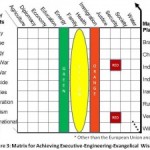
10 Steps To Victory In Afghanistan
Reform or Go Home (David Kilcullen) End Suicide Attacks (Robert Pape) If You Can’t Beat Them, Let Them Join (Linda Robinson) Pump Up the Police (Anthony Cordesman) Kick Out Corruption (Nader Nadery) Learn to Tax From the Taliban (Gretchen Peters) Polls Have the Power (Merrill McPeak) Take a Risk (Andrew McDonald Exum) Don’t Believe That We Can Afford to Lose (Frederick Kagan) Pakistani Patronage (Paul Pillar)

4 Broad Strategies Weighed — From Pullout To Boosting Troop Level
Getting out Scaling back
Staying put Ramping up

Phi Beta Iota: In the context of holistic strategy and integrated analytics as depicted by the two thumbnails (click on each to get to the larger graphic), we are stunned by the mediocrity and myopia of the “conventional wisdom.” It's all connected. Absent a coherent world view and strategic analytic model with integrity, this Administration is toast. The Republic has no strategy, no mature threat construct, no Whole of Government planning, programming, and budgeting system (PPBS), and zero integrity in the sense of being honest about the totality of the substance of governance.








